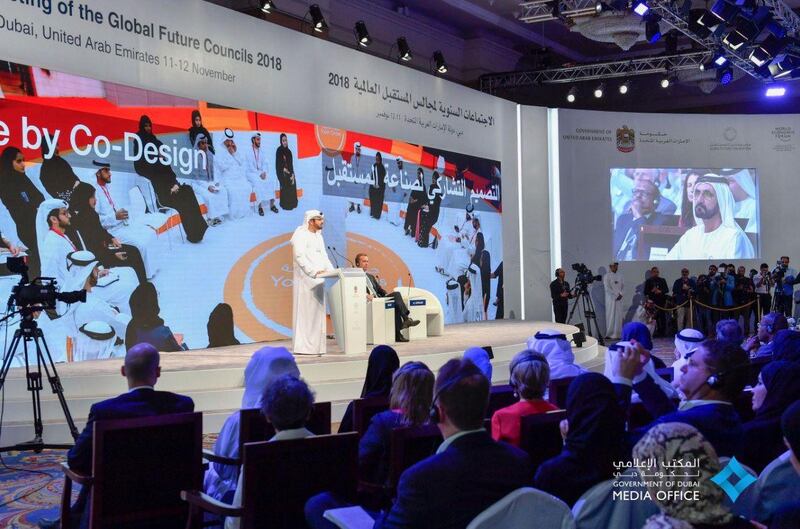The UAE will begin developing laws governing self-driving cars and artificial intelligence to prepare the country to embrace the technologies of the future.
Mohammad Al Gergawi, Minister of Cabinet Affairs and the Future, set out details of the plan at the opening of the World Economic Forum’s (WEF) Global Future Councils in Dubai on Sunday.
He told the audience that the decision by the President, Sheikh Khalifa, on Saturday to allow the Cabinet to grant licences for future technologies will ensure the country is an example to other governments across the globe.
The establishment of RegLab will provide a safe testing environment for new technologies which will then help to establish future laws about their use, he said.
“The UAE is going to become a laboratory of legislations with this announcement,” he said.
“We are going to be looking at the legislation around self-driving cars, 3D printers and other kinds of artificial intelligence that governments all over the world are trying to understand.”
He said that the time when governments could work alone are long gone and that countries must work together for the sake of world’s future.
“When governments do not work together and try to go it alone it only creates delays,” he said.
“The accumulative effect of countries not updating their legislation has been $4 trillion to date. If one country had that money they would be among the richest in the world.
“We have already seen some states distance themselves from others and turn to protectionism but that is not the answer.”
Mr Al Gergawi said the rise of companies like Amazon and Apple showed how quickly technology was advancing and that it was up to governments across the world to continue to adapt.
“We are going to attempt to find clearer answers to the issues of the future,” he said.
“We shall work as a united task force to develop the goals of humanity. The future is the hands of those who can imagine and design it, this is about the future of the world.”
محمد بن راشد، بحضور حمدان ومكتوم بن محمد، يطّلع على منصّة التحول المستقبلي ضمن الاجتماعات السنوية لمجالس المستقبل العالمية#دبي pic.twitter.com/5PiQYKnAXr
— Dubai Media Office (@DXBMediaOffice) November 11, 2018
There could be dire consequences if the use of artificial intelligence including drones and self-driving cars is not regulated properly, said World Economic Forum president Børge Brende.
“There need to be rules for the new technology,” he said. The UK is currently reviewing its laws to consider responsibility if a self-driving vehicle is involved in an accident, before it allows such cars on the roads.
He went on to say that "cyber-attacks are on the rise and digital transactions now account for 12 per cent of all trade in the world".
Mr Brende said we were only at the beginning of understanding the challenges of the digital frontier.
“The world is changing. You only have to look at the fact that many of the largest companies in the world did not exist 10 years ago,” he said.
“That is why we are relying on the input of the Global Futures Council over the next two days. It is the biggest brainstorming session in the world.”
_______________
Read more:
Sheikh Mohammed opens World Economic Forum event in Dubai
How Dubai is striving to ensure artificial intelligence is 'ethical'
New UAE laws needed to prepare for advances in self-driving cars
_______________
The opening day of the Global Future Councils meeting also saw the announcement of a proposed framework for the regulation of personal data.
The newly-announced framework will act as a guide for policy and decision makers on how to effectively regulate personal data.
“There is a need for robust policy frameworks to govern disruptive trends,” said a spokesman for the Ministry of Cabinet Affairs and the Future.
The framework, called Data Policy in the Fourth Industrial Revolution: Insights on Personal Data, was the first policy paper to come out of the collaboration between the UAE's Ministry of Cabinet Affairs and the Future and the WEF's network of Centres for the Fourth Industrial Revolution.
The centres were set up to bring together governments, leading companies, civil society and experts from around the world to help shape the governance of technology.
The project was created to shape the development and use of technology in ways that maximise the benefits while minimising the risks.
The scheme aims to create projects that can be adopted by policy-makers, legislators and regulators worldwide.
“Data policy choices are not binary decisions with clean and clear lines – data policy is more like a 3D puzzle,” said Anne Toth, WEF’s head of data policy.
“There are over 120 different data protection laws currently in effect across the world.”







